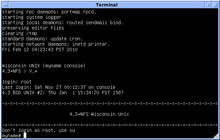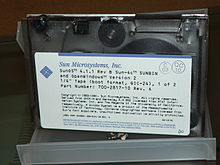Berkeley Software Distribution
Intel 80386 | |
| Kernel type | Monolithic |
|---|---|
| Userland | BSD |
| Influenced | NetBSD, FreeBSD, OpenBSD, DragonFly BSD, macOS |
| Influenced by | Unix |
| Default user interface | Unix shell |
| License | BSD |
The Berkeley Software Distribution or Berkeley Standard Distribution[1] (BSD) is a discontinued operating system based on Research Unix, developed and distributed by the Computer Systems Research Group (CSRG) at the University of California, Berkeley. The term "BSD" commonly refers to its open-source descendants, including FreeBSD, OpenBSD, NetBSD, and DragonFly BSD.
BSD was initially called Berkeley Unix because it was based on the
Later releases of BSD provided the basis for several
History
The
BSD began life as a variant of Unix that programmers at the University of California at Berkeley, initially led by Bill Joy, began developing in the late 1970s. It included extra features, which were intertwined with code owned by AT&T.
In 1975, Ken Thompson took a sabbatical from Bell Labs and came to Berkeley as a visiting professor. He helped to install Version 6 Unix and started working on a Pascal implementation for the system. Graduate students Chuck Haley and Bill Joy improved Thompson's Pascal and implemented an improved text editor, ex.[10] Other universities became interested in the software at Berkeley, and so in 1977 Joy started compiling the first Berkeley Software Distribution (1BSD), which was released on March 9, 1978.[11] 1BSD was an add-on to Version 6 Unix rather than a complete operating system in its own right. Some thirty copies were sent out.[10]
The second Berkeley Software Distribution (2BSD), released in May 1979,[12] included updated versions of the 1BSD software as well as two new programs by Joy that persist on Unix systems to this day: the vi text editor (a visual version of ex) and the C shell. Some 75 copies of 2BSD were sent out by Bill Joy.[10]

A VAX computer was installed at Berkeley in 1978, but the port of Unix to the VAX architecture, UNIX/32V, did not take advantage of the VAX's virtual memory capabilities. The kernel of 32V was largely rewritten to include Berkeley graduate student Özalp Babaoğlu's virtual memory implementation, and a complete operating system including the new kernel, ports of the 2BSD utilities to the VAX, and the utilities from 32V was released as 3BSD at the end of 1979. 3BSD was also alternatively called Virtual VAX/UNIX or VMUNIX (for Virtual Memory Unix), and BSD kernel images were normally called /vmunix until 4.4BSD.

After 4.3BSD was released in June 1986, it was determined that BSD would move away from the aging VAX platform. The Power 6/32 platform (codenamed "Tahoe") developed by Computer Consoles Inc. seemed promising at the time, but was abandoned by its developers shortly thereafter. Nonetheless, the 4.3BSD-Tahoe port (June 1988) proved valuable, as it led to a separation of machine-dependent and machine-independent code in BSD which would improve the system's future portability.
In addition to portability, the CSRG worked on an implementation of the OSI network protocol stack, improvements to the kernel virtual memory system and (with Van Jacobson of LBL) new TCP/IP algorithms to accommodate the growth of the Internet.[13]
Until then, all versions of BSD used proprietary AT&T Unix code, and were therefore subject to an AT&T software license. Source code licenses had become very expensive and several outside parties had expressed interest in a separate release of the networking code, which had been developed entirely outside AT&T and would not be subject to the licensing requirement. This led to Networking Release 1 (Net/1), which was made available to non-licensees of AT&T code and was freely redistributable under the terms of the BSD license. It was released in June 1989.
After Net/1, BSD developer Keith Bostic proposed that more non-AT&T sections of the BSD system be released under the same license as Net/1. To this end, he started a project to reimplement most of the standard Unix utilities without using the AT&T code. Within eighteen months, all of the AT&T utilities had been replaced, and it was determined that only a few AT&T files remained in the kernel. These files were removed, and the result was the June 1991 release of Networking Release 2 (Net/2), a nearly complete operating system that was freely distributable.
Net/2 was the basis for two separate ports of BSD to the
BSDi soon found itself in legal trouble with AT&T's
The final release from Berkeley was 1995's 4.4BSD-Lite Release 2, after which the CSRG was dissolved and development of BSD at Berkeley ceased. Since then, several variants based directly or indirectly on 4.4BSD-Lite (such as FreeBSD, NetBSD, OpenBSD and DragonFly BSD) have been maintained.
The permissive nature of the
Relationship to Research Unix
Starting with the 8th Edition, versions of
Research Unix 8th Edition started from (I think) BSD 4.1c, but with enormous amounts scooped out and replaced by our own stuff. This continued with 9th and 10th. The ordinary user command-set was, I guess, a bit more BSD-flavored than SysVish, but it was pretty eclectic.
Relationship to System V
In 1989, David A. Curry wrote about the differences between BSD and System V. He characterized System V as being often regarded as the "standard Unix." However, he described BSD as more popular among university and government computer centers, due to its advanced features and performance:[19]
Most university and government computer centers that use UNIX use Berkeley UNIX, rather than System V. There are several reasons for this, but perhaps the two most significant are that Berkeley UNIX provides networking capabilities that until recently (Release 3.0) were completely unavailable in System V, and that Berkeley UNIX is much more suited to a research environment, which requires a faster file system, better virtual memory handling, and a larger variety of programming languages.
Technology
Berkeley sockets

Berkeley's Unix was the first Unix to include libraries supporting the
By integrating sockets with the Unix operating system's file descriptors, it became almost as easy to read and write data across a network as it was to access a disk. The AT&T laboratory eventually released their own STREAMS library, which incorporated much of the same functionality in a software stack with a different architecture, but the wide distribution of the existing sockets library reduced the impact of the new API. Early versions of BSD were used to form Sun Microsystems' SunOS, founding the first wave of popular Unix workstations.
Binary compatibility
Some BSD operating systems can run native software of several other operating systems on the same architecture, using a binary compatibility layer. This is much simpler and faster than emulation; for example, it allows applications intended for Linux to be run at effectively full speed. This makes BSDs not only suitable for server environments, but also for workstation ones, given the increasing availability of commercial or closed-source software for Linux only. This also allows administrators to migrate legacy commercial applications, which may have only supported commercial Unix variants, to a more modern operating system, retaining the functionality of such applications until they can be replaced by a better alternative.
Standards
Current BSD operating system variants support many of the common
BSD descendants
Several operating systems are based on BSD, including FreeBSD, OpenBSD, NetBSD, MidnightBSD, MirOS BSD, GhostBSD, Darwin and DragonFly BSD. Both NetBSD and FreeBSD were created in 1993. They were initially derived from 386BSD (also known as "Jolix"), and merged the 4.4BSD-Lite source code in 1994. OpenBSD was forked from NetBSD in 1995, and DragonFly BSD was forked from FreeBSD in 2003.
BSD was also used as the basis for several proprietary versions of Unix, such as Sun's SunOS, Sequent's DYNIX, NeXT's NeXTSTEP, DEC's Ultrix and OSF/1 AXP (now Tru64 UNIX). NeXTSTEP later became the foundation for Apple Inc.'s macOS.
See also
- BSD Daemon
- BSD licenses
- Comparison of BSD operating systems
- List of BSD operating systems
- Lumina (desktop environment)
- Unix wars
References
- ^ "Why you should use a BSD style license for your Open Source Project". The FreeBSD Project. BSD (Berkeley Standard Distribution). Retrieved August 3, 2021.
- ^ "Apple Kernel Programming Guide: BSD Overview". Retrieved March 27, 2021.
- ^ "Actually, Windows DOES use some BSD code". Archived from the original on March 25, 2018. Retrieved March 24, 2018.
- ^ "Kernel". PlayStation 5 Dev Wiki.
- ^ "Open Source Software used in PlayStation 4". Archived from the original on December 12, 2017. Retrieved October 3, 2019.
- ^ "Open Source Software used in PlayStation 3". Archived from the original on November 11, 2017. Retrieved December 8, 2022.
- ^ "Open Source Software used in PlayStation Vita". Archived from the original on December 12, 2017. Retrieved December 8, 2022.
- ^ "任天堂製品に関連するオープンソースソフトウェアのソースコード配布ページ|サポート情報|Nintendo". www.nintendo.co.jp. Archived from the original on July 26, 2020. Retrieved July 26, 2020.
- ^ Cao (March 8, 2017). "Nintendo Switch runs FreeBSD". FreeBSDNews.com. Archived from the original on July 26, 2020. Retrieved July 26, 2020.
- ^ a b c d Salus, Peter H. (2005). "Chapter 7. BSD and the CSRG". The Daemon, the Gnu and the Penguin. Groklaw. Archived from the original on June 14, 2020. Retrieved September 6, 2017.
- ^ Salus (1994), p. 142
- The Unix Heritage Society. Archivedfrom the original on July 9, 2006. Retrieved October 6, 2010.
- ^ McKusick, M.K.; Karels, M.J.; Sklower, Keith; Fall, Kevin; Teitelbaum, Marc; Bostic, Keith (1989). "Current Research by The Computer Systems Research Group of Berkeley" (PDF). Proceedings of the European Unix Users Group Spring Conference.
- ^ Eric S. Raymond. "The Art of Unix Programming: Origins and History of Unix, 1969–1995". Archived from the original on October 5, 2014. Retrieved July 18, 2014.
- ^ Barr, Adam (June 19, 2001). "Microsoft, TCP/IP, Open Source, and Licensing". Archived from the original on November 14, 2005. Retrieved June 7, 2019.
- ^ "BSD Code in Windows". everything2.com. March 20, 2001. Archived from the original on August 25, 2008. Retrieved January 20, 2009.
- ^ Dennis Ritchie (October 26, 2000). "alt.folklore.computers: BSD (Dennis Ritchie)". Archived from the original on July 14, 2014. Retrieved July 3, 2014.
- ^ Raymond, Eric S. The Art of Unix Programming. 2003. p. 38
- ^ Curry, David. Using C on the UNIX System: A Guide to System Programming. 1989. pp. 2–3
- .
- RFC 681
- S2CID 5700897.
Bibliography
- Marshall K. McKusick, Keith Bostic, Michael J. Karels, John S. Quartermain, The Design and Implementation of the 4.4BSD Operating System (Addison Wesley, 1996; ISBN 978-0-201-54979-9)
- Marshall K. McKusick, George V. Neville-Neil, The Design and Implementation of the FreeBSD Operating System (Addison Wesley, August 2, 2004; ISBN 978-0-201-70245-3)
- Samuel J. Leffler, Marshall K. McKusick, Michael J. Karels, ISBN 978-0-201-06196-3)
- ISBN 978-1-56592-582-3.
- ISBN 978-0-9790342-3-7)
- ISBN 978-0-201-54777-1)
- ISBN 978-0-201-87674-1)
External links
- Berkeley Software Distribution at Curlie
- A timeline of BSD and Research UNIX
- UNIX History – History of UNIX and BSD using diagrams
- The Design and Implementation of the 4.4BSD Operating System
- The Unix Tree: Source code and manuals for old versions of Unix
- EuroBSDCon, an annual event in Europe in September, October or November, founded Archived June 20, 2020, at the Wayback Machine in 2001
- BSDCan, a conference in Ottawa, Ontario, Canada, held annually in May since 2004, in June since 2015
- AsiaBSDCon, a conference in Tokyo, held annually in March of each year, since 2007
- mdoc.su – short manual page URLs for FreeBSD, OpenBSD, NetBSD and DragonFly BSD, a web-service written in nginx
- BXR.SU – Super User's BSD Cross Reference, a userland and kernel source code search engine based on OpenGrok and nginx
